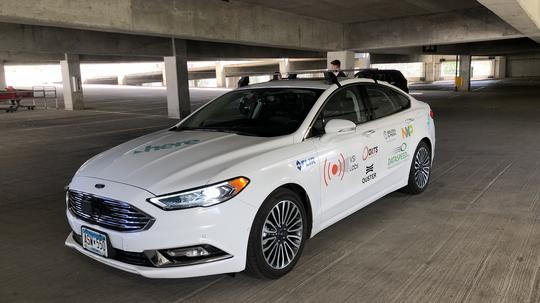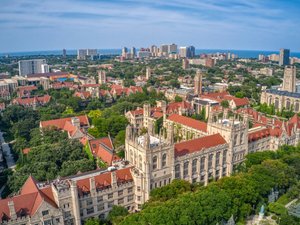
For anyone who has ridden in a self-driving car, they know it’s a little weird when you realize the car you’re in technically has a mind of its own.
While taking a demo ride in one through Monday afternoon traffic on Chicago's Kennedy Expressway, I was watching the steering wheel guide us, which was fascinating, to say the least.
The car, a 2018 Ford Fusion outfitted with autonomous tech, was owned by VSI Labs, a Minneapolis-based autonomous vehicle research firm whose clients include General Motors, Uber and LG Electronics. The company has been working with HERE Technologies over the last year and a half to integrate HERE’s high-definition live map into its autonomous vehicle software.
HERE’s map is much more advanced than your average navigation system. The map is extremely detailed, allowing the vehicle to know aspects of the road that it needs to drive safely. Using the map, the car can recognize how many lanes a street has, what they are each used for, lane markings and crosswalks, and anything else a car needs to know to stay centered in a single lane.
“It has metadata for all the information that comes with this road,” said Matthew Preyss, HERE’s product marketing manager of autonomous driving and connected services.
Here I am riding in an autonomous vehicle for the first time with @VSI_Labs and @here. We’re on the expressway! pic.twitter.com/WHPkADVoQ1
— Katherine Davis (@katmeldavis) June 10, 2019
The car we were in had complete autonomous capabilities, meaning it could literally drive itself—no driver assistance needed. But for the purposes of our ride, our driver, VSI Labs AV Solutions Engineer Matthew Linder, navigated us to the expressway first before enabling any autonomous capabilities. Once he did, Linder was still controlling the gas and break. The only thing the car was doing on its own was keeping us in our lane and occasionally switching lanes.
The federal government has adopted the Society of Automotive Engineers’ autonomous vehicle classification, which organizes autonomous vehicles into various categories: Those that have no autonomous functions, those that are conditionally-automated, and those that can completely operate on their own without a driver. Right now, current Illinois law only allows for the testing and driving of conditionally-automated vehicles—cars that require a driver in them.
Until recently, Illinois had been slower to experiment with the new tech. Meanwhile, fully autonomous vehicles have been tested on roads in other states, such as Arizona and California, usually with drivers behind the wheel ready to take over if needed.
It wasn’t until late last year that Illinois finally launched an autonomous vehicle initiative to research and test the emerging technology. The initiative aims to bring together companies, universities, research institutions and other technology partners that are or have an interest in working on driverless cars.
Preyss said that since the initiative launched, HERE has been working with state regulators on autonomous vehicle research.
“They reach out to us for our input, mostly on an educational basis,” Preyss said. “We’re definitely involved, but it’s largely up to how the officials want to test.”
In August, HERE and VSI’s autonomous tech will hit the road for a cross country trip from Minneapolis to California. The purpose is to gather data on how the car performs on a long trip, and in other regions and weather conditions.
Preyss said HERE's high-definition live maps will be available in vehicles in 2020 as its already made deals with Daimler and BMW. But in five years, Preyss said he expects most of the cars produced by mainstream manufacturers to be conditionally-automated.
“As those technologies evolve and become cheaper, then the mass production car manufacturers, like the Toyotas and Volkswagens, will follow suit,” he said.








